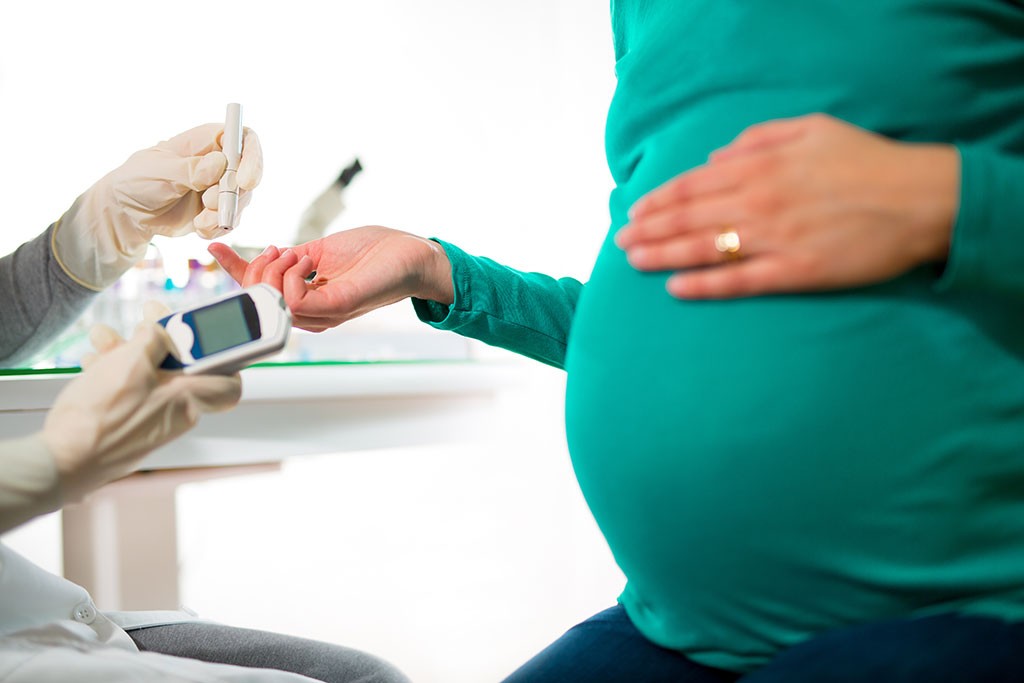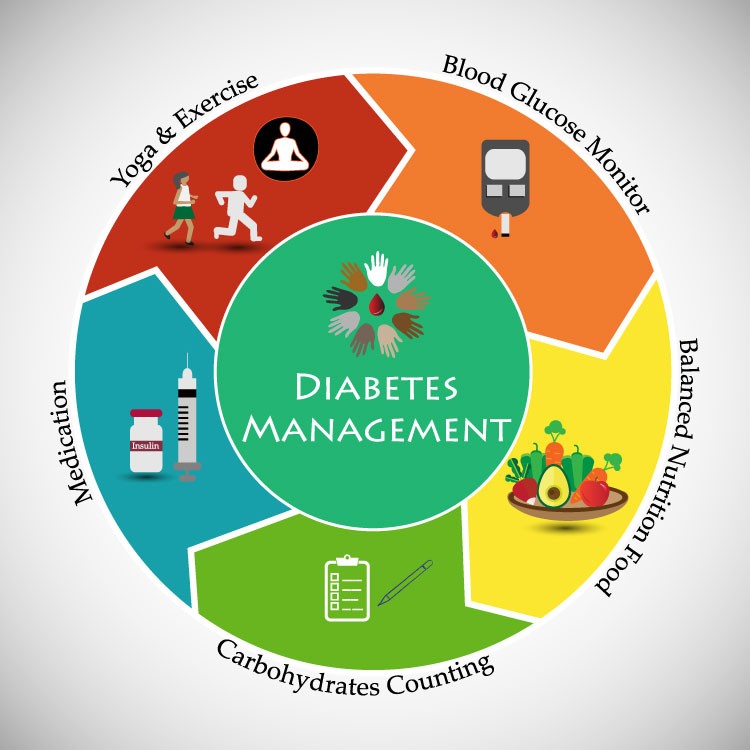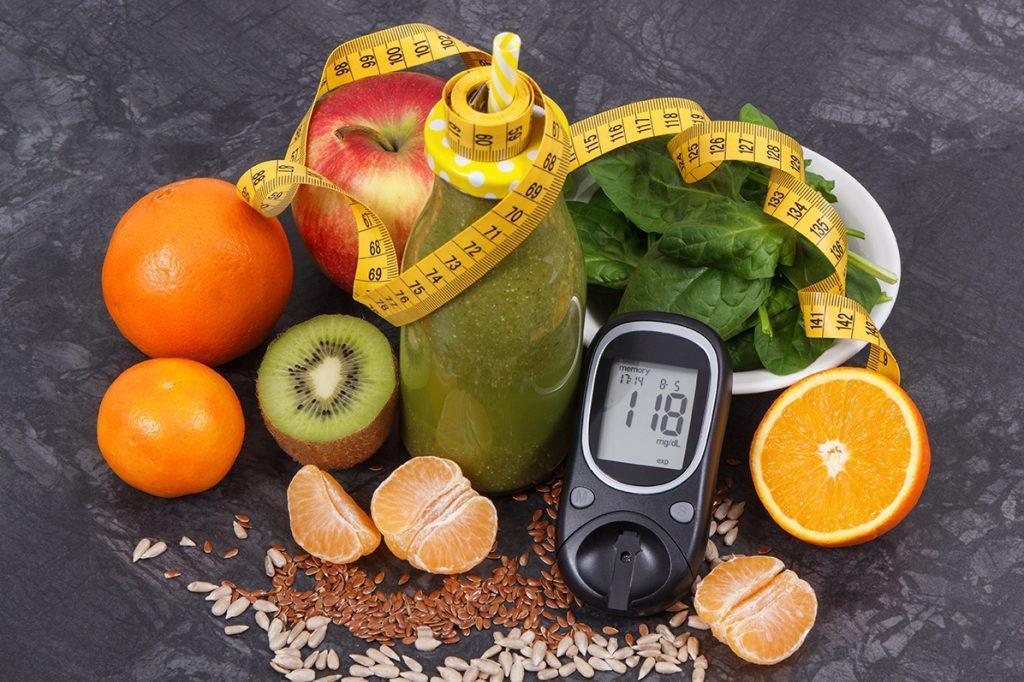Last updated on August 30th, 2022
Pregnancy is the best gift a woman expects in her life. A woman goes through various transformations physically and mentally during pregnancy. Managing all these changes requires a positive attitude and a healthy body. But what if a woman is already diabetic? Should she go ahead with pregnancy or should she be worried about it? What if a woman develops diabetes during pregnancy? Read this article to know more about effects of diabetes on pregnancy.

Diabetes and Pregnancy
Diabetes is a condition when the blood glucose levels are not normal. It is due to the body being resistant to insulin or due to deficiency of insulin. As a result, blood glucose levels are high. High blood glucose levels can damage nerves, and vessels, and can impact the eyes, heart, and kidney.
But what if a Woman is diabetic and is pregnant? Researches have proved that diabetes does affect both woman and child during pregnancy. Moreover, a healthy woman may become diabetic during pregnancy that may cause trouble during her pregnancy. Thus, proper care must be taken during pregnancy if you are already diabetic.
Ideal Blood Glucose Levels During Pregnancy
For most pregnant women with diabetes the ideal blood glucose levels should be within the following range:
- Overnight fast or at bedtime: 90 mg/dL
- After 1 hour of eating: 130 mg/dL to 140 mg/dL
- 2 hours after eating: less than 120 mg/dL [1].
Therefore, a woman must maintain these above sugar levels in pregnancy to avoid any complications of diabetes in pregnancy.
Effects of Diabetic Pregnancy on the Fetus and Newborn
Birth Defects Due to Diabetes: The first eight weeks of pregnancy is crucial for baby’s development. Especially, the key organs like the brain, heart, kidney, and lungs start developing in the first eight weeks. In such a situation, a high blood sugar level can be dangerous to the baby’s organ development. Thus, high blood sugar levels due to diabetes can cause birth defects, heart defects, and brain or spinal cord defects in the newborn.
Fetal Death: Due to poor circulation, high blood pressure, and nerve and vessel damage due to diabetes, the growth of the baby in the womb may be slow. This can cause the death of the baby in the uterus.
Macrosomia: It is a medical condition wherein the baby is larger than normal size. When the mother suffers from a high blood sugar condition, the baby in the womb makes more insulin to use this high sugar. This causes fat accumulation and the growth of the baby. Thus, the baby size is more than the normal size. This can cause injury during pregnancy to the mother. It is also responsible for early birth.
Newborn with Breathing Problems: With more insulin and glucose in the blood, the lungs of the baby are not developed fully. Such babies likely suffer from breathing issues and are generally born in 37 weeks of pregnancy.
Hypoglycemia Attack: Due to high blood sugar levels in the womb, the baby has a high content of insulin in the body. After birth, the high insulin content remains the same, but the glucose levels are normal. This causes low glucose levels leading to Hypoglycaemia. In some cases, the newborns may have hypoglycaemic attacks and seizures.
Summary
Diabetes can cause breathing issues, overweight, hypoglycaemic attack in new-born and can lead to birth defects or fetal deaths.
Effects of Diabetes During Pregnancy on the Pregnant Women
Kidney problems: High blood sugar due to diabetes may be dangerous during pregnancy especially for the kidney. With hormonal changes, the ketone levels in the blood and urine may go high. These if left untreated can cause diabetes ketoacidosis and other kidney-related issues.
Preeclampsia: This is a life-threatening medical problem for pregnant women and the baby. With too much protein due to weight gain, high blood pressure, and high blood glucose levels. It can cause seizures, eclampsia and can be fatal. It begins in 20 weeks of pregnancy. To avoid complications the delivery is carried out by 37 weeks.
Eye problem: Due to high blood glucose levels there might be chances of eye or vision problems.
Summary
Diabetes can cause damage to the eye, kidney, and other organs of the woman. It can cause a life-threatening condition of preeclampsia.

Planning Pregnancy While Already Diabetic
You should consult your diabetes practitioner at least six months in advance, before aiming for pregnancy. It is highly essential to maintain healthy blood glucose levels before pregnancy. Thus, the diabetic practitioner shall give necessary guidance, diet regulations, medicines, and supplements that control the blood sugar levels opt for pregnancy.
Regular monitoring should be carried out to ensure the blood glucose levels are properly maintained.
Pregnancy & Gestational Diabetes
What is it?
Some women, who have no history of diabetes in their life, can turn out to have diabetes during pregnancy. The cause of gestational diabetes is mainly due to weight gain and hormonal change during pregnancy. Thus, during pregnancy sometimes your blood sugar levels may fluctuate from normal. Moreover, your body may not respond to insulin or fails to produce insulin than what is required. As a result, blood sugar levels may go high causing gestational diabetes mellitus.
It usually happens in the second half of pregnancy. Pregnancy diabetes can affect both women and the baby in the same ways as diabetes affects them.
Causes
The leading gestational diabetes causes are as follows:
- It occurs due to the hormonal change of pregnancy.
- When the blood sugar levels during pregnancy are not controlled properly it can lead to gestational diabetes.
- Poor lifestyle, bad eating habits during pregnancy can fluctuate blood sugar levels.
- Being overweight and having a family history of type- 1 or type-2 diabetes.
- Poly-ovarian cyst syndrome and other mensuration problems.
Symptoms
In most cases, gestational diabetes has no clear symptoms but if you notice one of them then you should contact your doctor as soon as possible:
- Feeling thirsty more than usual.
- Frequent urination.
- Excessive hunger
- Feeling tired and fatigue
- Sweating
Some Warning Gestational Diabetes Symptoms
- Having a blurry vision
- Excessive feeling of thirstiness
- Nausea
- Urination
- Skin infection and fungal infections
- Unconsciousness
Summary
Signs and symptoms of gestational diabetes include excessive thirst, fatigue, frequent urination, skin infection, and sugar in the urine.
Effect of Gestational Diabetes on Pregnancy
The gestational diabetes complications are similar to the effects of diabetes on pregnant women and the baby. Thus these are as follows:
- Birth defects. Defects in the heart, kidney, or lungs of the baby.
- Fetal death or miscarriage
- Macrosomia. Having an extra-large baby.
- Breathing issues in the newborn. This happens due to poor lung development.
- Hypoglycemia attack in the newborn.
- Kidney problems in women. High blood pressure, high sugar, and high ketones can cause renal damage and diabetic ketoacidosis.
- Preeclampsia. A serious condition when high blood pressure can cause seizures and early birth deliveries.
- Eye problems.
- Early delivery of the baby.
- Future diabetes in the woman who had no previous diabetes problem. Gestational diabetes can cause type 2 diabetes in women after delivery.
Summary
Gestational diabetes occurs in pregnant women and can lead to birth defects, delivery problems, and future diabetes in women.
Managing Diabetes During Pregnancy
To-do List
To avoid diabetic complications during pregnancy do the following things:
- Work with your health team: Regularly visit your health team for regular health monitoring of you and your baby. Follow their advice strictly. Always keep their contact numbers ready.
- Get check-up. You need to get all the necessary medical check-ups. The doctor may advise blood tests, urine tests, Ultrasound scans.
- Quit smoking and avoid alcohol consumption: Smoking can cause damage to the fetus and can cause premature delivery. Alcohol can cause liver issues and diabetes it can cause blood pressure and liver problems. Avoid these too to avoid complications.
- Be physically active: Seek health expert advice and try to keep yourself active through exercises. This shall keep cholesterol levels, blood pressure, stress, and blood sugar levels under control. It shall strengthen your bones and improvise your blood circulation. Aim to do some physical activity for 30minutes daily. 30-60 minutes of aerobic exercise 2-7 times per week shall keep weight under control and enhance your health condition.
- Take medicines and supplements regularly: If you have a complaint of thyroid, blood pressure along diabetes, the doctor may prescribe medicines. Sometimes you may be required to take insulin injections. Moreover, you should take extra supplements like vitamins and minerals, calcium, and folic acid. These are for the baby healthy development in the fetus and for providing essential nutrients to the body.
- Have a proper diet plan. Consult a dietician and follow a proper diet plan that controls your sugar levels. Drink plenty of water to keep hydrated. Consume fibrous food to help you in weight control and bowel movement.
Also read:- Controlling blood sugar through diet and exercise
Diet During Pregnancy
What Food Should You Eat if?
If you have diabetes during pregnancy, eat low or medium Glycemic index foods and rich fibrous foods. Some gestational diabetes diet tips are as follows:
- Consume 3 to 5 servings of fruits during lunch and breakfast. Vitamin C-rich, Calcium-rich fruits like Apple, Banana, Grapes, berries.
- Take 1 to 2 servings of whole grains and Legumes per Day. For example lentils, peas, beans, chickpeas, soybeans, and peanuts.
- Eat non-starchy vegetables at least 3 to 5 servings per day. For example leafy green vegetables like lettuce, spinach, kale, beet greens, etc.
- 1 portion of protein food. For example, Fish, Egg, Meat.
- Get 1 to 3 servings of Natural herbs and spices per day.
- Increase fibre content. This is good for bowel moment, and weight management.
- Eat regularly and watch your portion size.
Calorie Requirements During Pregnancy:
- In the first 6 months of pregnancy, Women require 2000 calories per day.
- From the third trimester of pregnancy, you need 200 calories extra per day. i.e. 2230 kCals/day. This can be added through a small snack.
- Your pregnancy diabetes diet portion must be balanced. In order to maintain a balance based follow the below diet chart.
| Fat content | 25gm |
| Calcium content | 600 mg |
| Carbohydrates | 300gm |
| Protein | 60 gm |
| Iron | 20mg |
| Sodium | 1000mg |
| Total | 2230 kCals/day |
The food you should avoid in diabetes during pregnancies.
- Mainly you should avoid food that has lots of sugar like oatmeal’s.
- Stop alcohol consumption.
- Avoid fast food, processed foods, and canned fruits
- It is not good to take sugary drinks like soda, sweet fruits, juices, etc.
- Cut off the very starchy food from your diet like white pasta, white rice, white bread, etc.
- Don’t take large portions of dairy products and red meat.
- Try to avoid confectionery and bakery products.
Also Read: vildagliptin and metformin hcl tablets
Diabetes, Pregnancy & Baby Monitoring
During pregnancy with diabetes, the risks towards the baby’s development are more. Thus, doctors may require special tests to monitor the baby’s growth in the womb. For women who are on insulin, following tests are highly essential:
- Ultrasound: Imaging tests based on sound waves help in creating images of the baby in the womb. This shall help in viewing baby development, organ growth, etc.
- Fetal movement counting: Counting the number of kicks per day helps in monitoring baby activity.
- Doppler study: Along with Imaging it helps in examining a baby’s blood flow and organ development.
- Test of Amniocentesis: This test gives idea on whether the lungs of the baby are fully developed or not. When the lungs are fully developed the doctors advise for Caesarean delivery to avoid complications.
- Biophysical profile: This helps in measuring heart rate, amniotic fluid, and other baby movements.
Summary
Various baby movement and monitoring tests are essential to ensure baby development and growth are perfect despite diabetes.
Diabetes Tests During Pregnancy
Doctors ask for blood glucose tests to diagnose gestational diabetes. The widely preferred test for gestational diabetes diagnosis is Oral Glucose Tolerance Test.
- A blood sample is drawn after 1hour of eating. When the blood glucose levels are > 140mg/DL, doctors shall ask for a 3-hour test. Glucose syrup is given. After 3 hours of taking syrup blood, glucose levels are again checked. Value > 140mg/dL indicates gestational diabetes.
- Tests shall be repeated by the 4th week of pregnancy for confirming gestational diabetes.
Sugar level during 8th month of pregnancy
- The normal fasting blood sugar in pregnancy is less than 95mg/dL.
- After one hour of the meal, it should be less than 180/dL.
- Two hours after the meal, it should be less than 155mg/dL.
Also Read: Diabetic Indian Diet
Bottom line:
Diabetes can create serious complications during pregnancy. Women who had gestational diabetes may suffer from future type 2 diabetes. It is therefore essential to get a regular check-ups for diabetes. Diabetes management requires a positive attitude, proper diet and lifestyle, and regular treatment.
FAQs:
When is insulin therapy essential in Gestational diabetes?
How early gestational diabetes can be diagnosed?
Can poor diet choices cause gestational diabetes?
References:
- ACOG Committee on Practice Bulletins. ACOG Practice Bulletin. Clinical management guidelines for obstetrician-gynecologists. Number 60, March 2005. Pregestational diabetes mellitus. Obstetrics and Gynecology. 2005;105(3):675–685. Reaffirmed 2014: www.acog.org/Resources-And-Publications/Practice-Bulletins-List External link.
Last Updated on by Dr. Damanjit Duggal
Disclaimer
This site provides educational content; however, it is not a substitute for professional medical guidance. Readers should consult their healthcare professional for personalised guidance. We work hard to provide accurate and helpful information. Your well-being is important to us, and we value your feedback. To learn more, visit our editorial policy page for details on our content guidelines and the content creation process.

 English
English

















